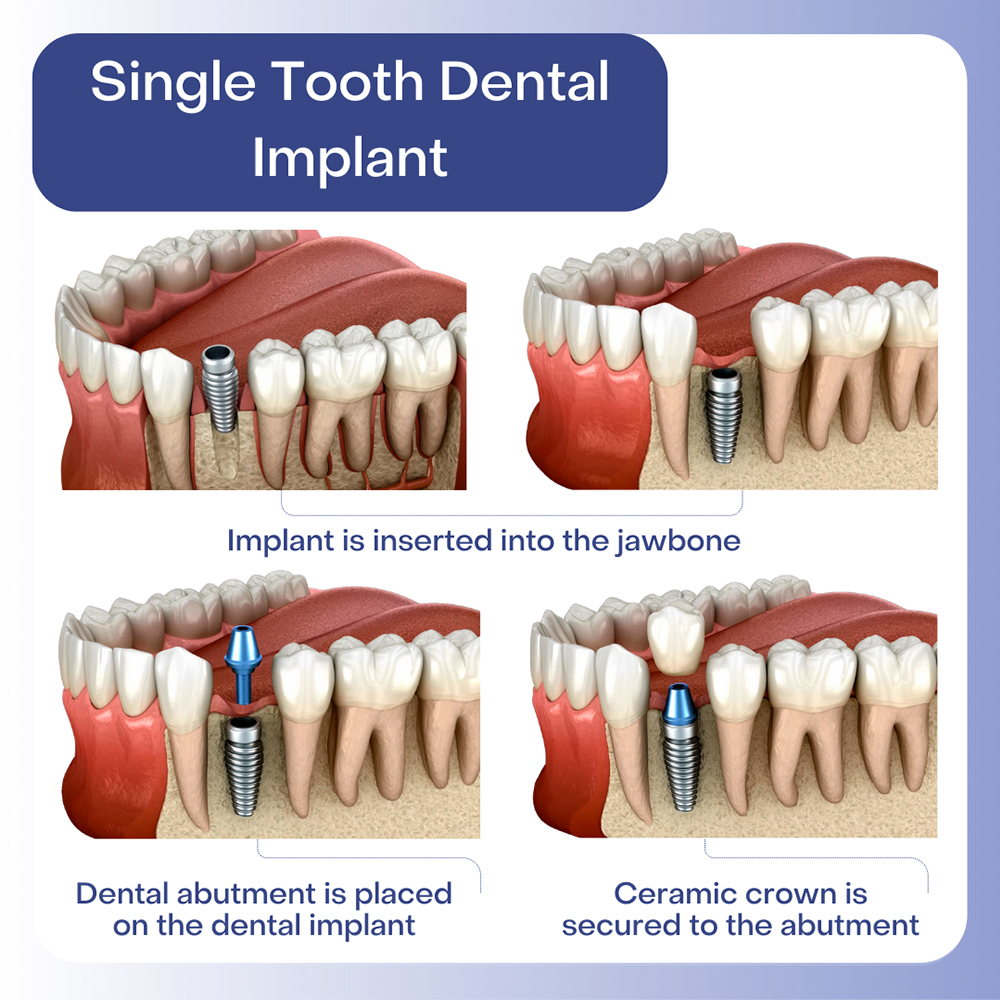Table of contents
Implant dentistry is a versatile solution for tooth loss and can be especially suitable when replacing a single tooth. If you are currently facing tooth loss or have a tooth that is failing, we may recommend this solution. It is long-lasting and can restore your tooth in a way that looks and feels like a real tooth.
 A single dental implant has a titanium or zirconia screw that is surgically inserted into your jawbone, replacing the missing tooth root. The implant screw is specially designed to integrate strongly with the surrounding bone and becomes firmly fused in place during a process called Osseointegration. It takes three months for this process to complete.
A single dental implant has a titanium or zirconia screw that is surgically inserted into your jawbone, replacing the missing tooth root. The implant screw is specially designed to integrate strongly with the surrounding bone and becomes firmly fused in place during a process called Osseointegration. It takes three months for this process to complete.
Once an implant has healed, we attach an abutment to the implant screw. This protrudes above the gum, looks like a small tooth stub, and supports your new implant crown. The implant crown is cemented onto the abutment or can be screwed in place. The screw goes directly through the implant crown, and the screw hole is covered with tooth-colored composite resin. This technique allows us to retrieve the crown easily if any maintenance or repair is required.
Sometimes, an implant crown can be attached to the implant soon after surgery, but this may be a temporary crown that will be replaced with a permanent restoration after healing is complete.
Most people are suitable for implants, but there are some requirements, including:
Dental implants need excellent oral care, so you must commit to looking after your implant to ensure it will be a long-term success.
There are several benefits to choosing this treatment.
After you lose a natural tooth, the jawbone that is used to surround the tooth root begins to resorb. Resorption can destabilize adjacent teeth, so they drift toward the gap, negatively impacting your bite.
A single dental implant is the only restoration that protects jawbone health, stimulating the surrounding bone like a natural tooth and preventing jawbone loss.
An implant provides a similar level of strength to a natural tooth, so you can eat anything you wish. The restoration should remain stable and strong with the proper after-care.
Because an implant is self-supporting, the adjacent teeth need not be reshaped or adapted to hold it in position. Instead, the implant helps prevent teeth from shifting position and shares the pressure of biting and chewing food.
Single implant teeth look exactly like real teeth. Your single-tooth implant will emerge from the gum just like an ordinary tooth. No one needs to know it is false except your dentist.
Dental implants are long-lasting and can provide a permanent solution for tooth loss. Although you may need to replace the implant crown later, it can be more cost-effective than budgeting for an alternative restoration like a dental bridge.
The process can take several months, but the results are well worth the effort. A cone beam CT scan and digital x-rays allow us to plan your implant treatment precisely. When you come to sit in the dental chair, we will know exactly where it is to be placed and how it will be angled to ensure the final restoration has excellent functionality and appearance.
Below are the steps in getting a single implant tooth.
A single dental implant can be placed using a local anesthetic, although we can provide sedation dentistry if needed. Our implant surgeon will make an incision into your gum, exposing the bone so we can drill a tiny hole to insert the implant.
At this stage, the implant may be covered and left to heal, or we can fit a temporary implant tooth under certain circumstances. Otherwise, we can provide another temporary tooth to fill the gap for cosmetic purposes.
After the implant has healed, we may place a healing cap over it, which helps shape the gum, ensuring that when your implant crown is fitted, the gum frames it nicely.
The next stage is to fit the abutment onto the implant screw, and we can fabricate your permanent crown. A digital dental impression is taken to ensure your implant crown is precision-made and in a shade that blends beautifully with your existing teeth.
Once your implant crown is ready, we can secure the implant permanently. You can brush and floss around your implant tooth as if it were real. It’s important to clean it regularly to ensure the gum around the implant remains strong, healthy, and free from infection.
With any dental treatment, there is always a small risk of complications afterward, but we take every precaution to minimize these risks. A dental implant can fail if an infection develops in the tissues surrounding it, or if you develop bruxism (clenching and grinding) and place a lot of pressure on the implant.
Usually, most people missing a single tooth find this restoration an excellent option, but everyone has different dental health needs. A full consultation at My New Jersey Dentist will let you learn more about this implant treatment, review samples of implant restorations, and determine if the treatment will provide the best outcome for your dental health.

My name is Victoria Kushensky. I am a general dentist dedicated to remaining at the forefront of my field. Combining compassionate care with extensive knowledge, I offer cosmetic and general dentistry services as well as advanced root canal treatments.
I earned my Doctor of Dental Surgery (DDS) degree from the esteemed New York University College of Dentistry. Throughout my career, I have honed my skills in various dental procedures, ensuring effective treatment for each patient’s unique needs. I prioritize patient comfort and understanding, taking the time to thoroughly explain procedures and address any questions.
More about Dr. KushenskyMy NJ Dentist: Victoria Kushensky, DDS
385 Prospect Ave Suite 304
Hackensack, NJ 07601
(201) 298-8000